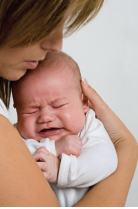The etiology of excessive infant crying is largely unknown but perhaps it has an early nutritional origin during fetal development. This study was undertaken to explore whether (1) maternal vitamin B12 and folate status during pregnancy are associated with excessive infant crying, and (2) whether and how maternal psychological wellbeing during pregnancy affects these associations. Women were approached around the 12th pregnancy week to complete a questionnaire (n=8266) and to donate a blood sample (n=4389); vitamin B12 and folate concentrations were determined in serum. Infant crying behavior was measured through a postpartum questionnaire (±3 months; n=5218). Vitamin B12 concentration (categorized into quintiles) was associated with excessive infant crying after adjustment for maternal age, parity, ethnicity, education, maternal smoking and psychological problems (OR[95%CI]: Q1=3.31[1.48-7.41]; Q2=2.50[1.08-5.77]; Q3=2.59[1.12-6.00]; Q4=2.77[1.20-6.40]; Q5=reference). Stratified analysis suggested a stronger association among women with high levels of psychological problems during pregnancy. Folate concentration was not associated with excessive infant crying. The authors concluded that a low maternal vitamin B12 status during pregnancy could, in theory, affect infant crying behavior through two potential mechanisms: the methionine-homocysteine metabolism and/or the maturation of the sleep-wake rhythm. Early Hum Dev. 2011 Apr;87(4):309-14. PMID: 21324613.







